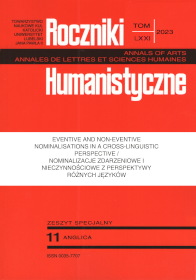Eventualities in Nominalisation Semantics: The Case of Denominal -ment Formations
Eventualities in Nominalisation Semantics: The Case of Denominal -ment Formations
Author(s): Sven Kotowski, Viktoria Schneider, Lea KawaletzSubject(s): Language and Literature Studies, Theoretical Linguistics, Morphology
Published by: Towarzystwo Naukowe KUL & Katolicki Uniwersytet Lubelski Jana Pawła II
Keywords: English morphology; derivational semantics; frame semantics; eventualities; nominalisations
Summary/Abstract: Many English nominalising suffixes give rise to derivatives that usually denote either eventualities or participants of eventualities (e.g. confirm → confirmation; train → trainee). The implicit consensus in the literature is that their eventuality-related semantics derives from base structures encoding eventualities, and that pertinent suffixes prefer verbs as bases given the natural concurrence of verbs and eventualities. Unsurprisingly, then, previous studies of nominalisation semantics deal nearly exclusively with deverbal formations. However, we also find denominal nouns with the same suffixes and similar semantics (e.g. sediment → sedimentation; debt → debtee), which poses questions on how such readings arise and how they should be modelled.In this paper, we report on eventuality-related denominal -ment formations. We employ a framesemantic approach to derivation that models nominalisation semantics as the potential to induce referential shifts on base structures. We make use of corpus attestations and show that denominal forms, just like deverbal ones, allow for referential shifts, but that the location of the eventuality within the semantic structure of the base differs depending on the base noun. We focus on two classes of nominal base nouns with different properties, namely, eventuality-denoting psych nouns and person-denoting attitudinal nouns, and formally model one representative of each class. Employing frame-based deep decomposition, we show that the input to -ment nominalisations systematically encodes eventualities, irrespective of the base’s part-of-speech, and therefore allows for extending the reference shifting approach to the denominal domain.
Journal: Roczniki Humanistyczne
- Issue Year: 71/2023
- Issue No: 11S
- Page Range: 149-173
- Page Count: 25
- Language: English

